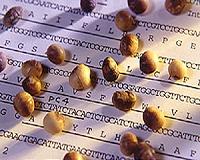 |
Le Grau Du Roi, France (AFP) Dec 12, 2010 Grapes on the vine crave sunshine, but wine growers in France and elsewhere are starting to worry that global warming is giving them too much of a good thing. And worry they should, if scientists are right. Predicted increases in average temperatures of two, three or even four degrees Celsius (3.6 to 7.2 degrees Fahrenheit) this century could spell the ruin of many of Europe's most fabled vineyards. Already, warning signs are abundant. Serious wine makers embrace the fickle weather that yields more-or-less memorable vintages. Dealing with yearly fluctuations is part of the alchemy of turning grape juice into elixir. But veterans who have nurtured and nursed vineyards over a period of decades are today reporting changes that chime perfectly with these threatening climate scenarios. "Overall, we are seeing a rise in alcohol content and a drop in acidity. That's a problem," said Laurent Audeguin, head of research and development at the French Institute for Vineyards and Wine (IFV), a national repository for grape varietals. "Acidity is crucial for the balance and the taste of wine, as well as for proper ageing," he explained. Too much heat and sun, in other words, means that grapes mature too quickly, throwing the delicate ratio between sugar and acid out of sync. Ironically, previous generations of grape growers ripped up vines that matured slowly and replaced them with slightly different variants of the same grapes -- mainly merlot, cabernet sauvignon, chardonnay and half-a-dozen others -- that yielded ripe fruit more quickly. "It's true that we've focused a lot on precocity in the last forty years," said Pascal Bloy, who oversees the more than 400 grape types grown at the Institute, near Montpellier. "The idea was to get a high maturity quickly. We realise now that this was probably a mistake." That could leave French wine growers, especially in the south, scrambling for long-term solutions. Bloy is eyeing varieties found in even warmer climes such as Greece and Portugal. But the identity of many wine regions in France -- the primacy of "terroir" notwithstanding -- are so closely tied to specific grapes that transplanting foreign ones is unthinkable. Fortunately, the IFV set aside some of the slow-maturing vines rejected decades ago, including a few that are now in experimental plots in Bordeaux. But some have disappeared altogether. Further north, for example, the IFV is scouring vineyards in the region of Charente looking for hardy, old specimens of the white-wine grape, ugni blanc, used to make Cognac. At the same time, they are prospecting with their Italian counterparts in Tuscany, where the varietal originates. "The closer we get to the original vineyards, the better chance we'll have of finding diversity and individual plants that correspond to today's needs," said Audeguin. In Gaillac, another sun-soaked region in southwestern France, a handful of dissident wine growers have stumbled almost by accident on a similar viticultural bulkhead against global warming. Driven by regional pride and a search for niche markets, they brushed aside scepticism from their fellow farmers and planted once-native grapes that had long since disappeared from Gaillac's rolling hills. It turns out that some of these ancient varieties -- a few, such as Mauzac, dating back to the era of the Roman occupation -- will probably fare better in a hotter world than the ones that replaced them. "These varietals that we are rediscovering are completely adapted to extreme climate conditions," said Bernard Plageoles, whose father pioneered the effort 30 years ago. Like-minded Michel Issaly, president of France's largest association of independent winemakers, first noticed changes in the region's fauna and flora. "We are seeing for the first time bird species from north Africa. In the vineyards, new types of weeds are growing even as others disappear," he said. In the short-run, he added, warmer temperatures have led to a series of stellar vintages, such as 2005 and 2009. "What's worrying is how quickly the change has taken place. If the increase is one or two degrees, we can cope. If it's much higher, the consequences will be dramatic," he said. "We're not there yet, and it is vital that everyone act responsibly -- in terms of the vineyards, water, energy use -- to stop global warming."
Share This Article With Planet Earth
Related Links Farming Today - Suppliers and Technology
 Wild seeds seen as world crop 'insurance'
Wild seeds seen as world crop 'insurance'London (UPI) Dec 10, 2010 British scientists say they plan to collect wild plant relatives of essential food crops including wheat, rice and potatoes to preserve their genetic traits. The project, coordinated by the Global Crop Diversity Trust, aims to safeguard valuable genetic traits in wild plants that could be bred into crops to make them more hardy and versatile, the BBC reported Friday. The plant m ... read more |
|
| The content herein, unless otherwise known to be public domain, are Copyright 1995-2010 - SpaceDaily. AFP and UPI Wire Stories are copyright Agence France-Presse and United Press International. ESA Portal Reports are copyright European Space Agency. All NASA sourced material is public domain. Additional copyrights may apply in whole or part to other bona fide parties. Advertising does not imply endorsement,agreement or approval of any opinions, statements or information provided by SpaceDaily on any Web page published or hosted by SpaceDaily. Privacy Statement |